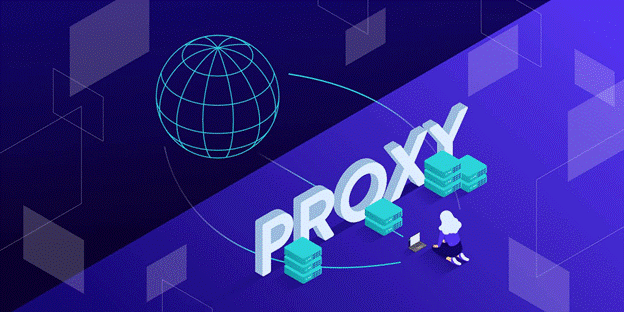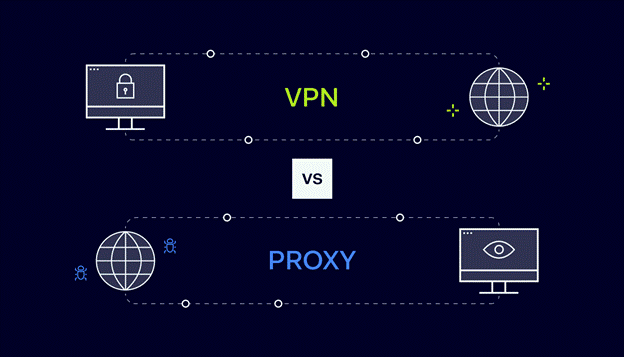During your online browsing experience, Proxy and VPN are common terms, but what exactly are they? We will explain these two powerful tools, and proxy vs vpn in this blog so you can protect your privacy and security online. But let’s first briefly explain what each of these terms is before we dive into the details of difference between proxy and vpn.
There are several different kinds of Proxy servers available on the Internet, but the most common kind is the Socks-based proxy servers. Proxy servers increase speed by storing cached content and also allow you to bypass geo-restrictions by changing the IP address.
VPNs (Virtual Private Networks) make connections between a remote server and your device that are secure and encrypted. With encrypting data and hiding your real IP address, they provide security, anonymity and access to restricted content.
Understanding Proxies

In general, proxy servers serve as gateways to the internet between users and the Internet. Thus, they help prevent cyber attackers from entering private networks. As a server that connects end users with online web pages, it is called an intermediary.
How a Proxy Works
The Internet Protocol (IP) address is unique to every computer on the internet. Think of it as your computer’s street address. Just like the post office knows to deliver mail to your street address, the internet knows how to send data to the correct computer using the IP address. An internet proxy server is a computer with an IP address that your computer knows. When you send a web request, the proxy server first receives it. In the end, the proxy server makes your web request on your behalf, collects the response from the web server, and forwards the page data to you in your browser.
If the proxy server forwards your web requests, it can make changes to the data you send and still return the information you request. Using a proxy server, you can change your IP address, so the web server won’t know where you are. Also, you can encrypt your data so that it can’t be read in transit and a proxy server can block access to certain web pages based on your IP address.
Different types of proxies
As we have seen, there are many types of proxy servers that are available depending on the protocol you use, but the following list focuses on the most popular.
The SOCKS Proxy Server
By using SOCKS (SOCKets Secure), you can securely route your Internet traffic through a server that uses TCP protocol. Once your traffic goes through this server, it automatically gets its own IP address. Socks proxy servers are used by SOCKS clients to route source packets through them. Some people confuse these proxies with VPNs but they do not function the same way. It has an improved authentication system and is fast. SOCKS5 is often used for applications that require anonymity and speed, such as torrenting and streaming.
The DNS Proxy
This type of proxy could entirely take the responsibility of a DNS server—resolving a domain name to an IP address, as well as serving as a DNS query forwarder, caching and forwarding queries to and for other DNS servers. An effective DNS proxy can speed up and improve the performance of domain lookups.
The Smart DNS Proxy
Its purpose is different from simple DNS proxies since Smart DNS proxies are based on a SmartDNS and a proxy. Smart DNS proxies send DNS queries to the SmartDNS instead of your local DNS or Google when you are trying to access geo-restricted content (such as Netflix). This site or service is geo-restricted so instead of resolving an IP address (real IP address destination), Smart DNS resolves an IP address of a proxy (which is physically located where the content is available. A smart DNS proxy is often used as an alternative to VPNs in order to gain access to geo-restricted content, such as Netflix, Hulu, HBO, and other streaming services.
HTTP Proxy Server
In HTTP proxies, HTTP requests and response messages are taken. An HTTP proxy server can be used as a proxy for anonymity during browsing online or for server protection if it is used for forwarding. It takes all your HTTP requests and forwards them to the target server (such as a website. Often, the HTTP proxy server is used both as a reverse proxy between a web client and a web server in order to filter content before it is served to the client. The proxy server intercepts the traffic that originates from the Internet and examines it for suspicious activities such as spyware, harmful websites, or malformed content.
SMTP Proxy Server.
Mail transfer intermediaries are called SMTP proxies. They process and filter email traffic, often referred to as spam proxy servers, which process and filter incoming or outgoing mail traffic. Inbound SMTP proxy servers help you filter spam, viruses, limit SMTP traffic, or load balance it.
FTP Proxy Server.
Basically, this proxy intercepts and relays all FTP traffic between the client and the server. The type of proxy is useful when you want to control FTP connections by using different parameters, such as the source IP address, the destination IP address, and authentication, but it’s also a useful way to limit file transfers in terms of amount and speed.
TOR Onion Proxy
TOR (The Onion Router) is a worldwide network of volunteer servers that encrypt and forward traffic. By itself, it provides a level of anonymity that makes Internet-tracing nearly impossible. The end-server can still identify the TOR’s exit node, AND your ISP can recognize an entry TOR router, even though your source IP cannot be traced back. A proxy can be used with TOR to keep the endpoint and your ISP from knowing about it.
SEO Proxy
A SEO proxy is typically a residential rotating proxy, which is used for large-scale intensive SEO campaigns so they can remain anonymous, be fast, error-free, and reliable. If the source IP address is discovered and blocked during SEO-based web scraping, the target site or search engine will be alerted. In addition to hiding the source IP, the SEO proxy can also be used with SEO tools like Scrapebox to analyze competition, research keywords, or even simulate traffic.
CGI Proxy
As a proxy service for Common Gateway Interfaces (CGI), a CGI proxy retrieves web content from the internet for clients. CGI proxies are accessed via a web browser and appear as normal websites. By entering the URL of the destination, the CGI displays the results as if it had initiated the request. A CGI proxy works by using an encrypted web form embedded within another webpage. CGI proxies are used for anonymous browsing and unblocking geo-restricted websites.
DHCP Proxy Agent
The proxy act as the intermediary for all DHCP requests and responses. It can be used as a server, a relay, or as a client to request or respond to DHCP requests. The PPP server (router) may act as the client in PPP communications by obtaining an IP address for the user. In addition to protecting the real DHCP server and network, DHCP proxy agents can also be used to optimize DHCP performance.
SIP Proxy
The Session Initiation Protocol (SIP) proxy improves communications between two SIP endpoints. It can forward and terminate SIP calls as it acts as an intermediary.
Advantages of using proxies
Enhance security
Users’ systems and the internet are protected by proxy servers. Without them, hackers can gain access to their networks through the use of their IP addresses. Some proxy server types can be configured to offer secure connections by using encryption. Businesses can block malware-infected websites by using transparent proxy servers.
Regulate internet usage
A proxy server is used by businesses and parents to control and monitor their children’s or employees’ internet usage. Companies can set up a proxy server to block access to such sites rather than redirecting and politely requesting people not to visit them when using company resources.
Save bandwidth and improve speeds
Bandwidth and improve A proxy server can help organizations improve the performance of their networks Popular websites can be cached by proxy servers, checking to see if they have the most recent version before sending users the saved version. Hundreds of users can access a website at once, but the proxy server sends only one request.
Enforce privacy
Businesses and individuals use proxy servers to browse the internet more privately. Some proxy servers will alter the IP address and other identifying information of the web request. The destination server does not know who made the original request, so users browsing history and personal information are more private.
Help access blocked resources
Proxy servers allow users to bypass access restrictions, which is useful for ethical hacking and digital forensics investigations. They give the impression that the investigator is somewhere else other than where they actually are.
limitations and drawbacks of proxies
Risk of exposing the information recorded through data logging
A proxy server stores users’ IP addresses along with the information they provide about their web requests. Some proxy providers fail to encrypt this data, and depending on the provider, they may even sell the information to third parties, putting consumers at risk of data breaches again. Before using a proxy, users should carefully review the terms and conditions.
Lack of encryption
Insecure connections cannot be used by a proxy without encryption. An unprotected proxy allows attackers to intercept messages quickly, placing any sensitive information such as usernames and passwords at risk. When using unsecured connections, users are also more vulnerable to data breaches. The best way to increase network security is to use encrypted proxies or virtual private networks (VPNs).
Spam attacks
When users connect to a proxy server, their providers start a session at the same time. At this time, they may post banners and ads that can hinder endpoint security, and even expose your systems to viruses.
Sluggish performance:
Since thousands to millions of user devices store data on unsecured channels, traffic over such channels is extremely high. In order to maintain internet speed with this volume of traffic, many proxy servers have limited bandwidth. Even premium proxy servers may have this problem.
Understanding VPNs

As the name implies, a VPN provides the opportunity to establish a secure network connection through public networks. VPNs encrypt your internet traffic and disguise your online identity, which makes it harder to track your activities online and steal your data. Encryption happens in real time.
How does a VPN work?
With a VPN, your IP address is hidden by routing it through a remote server configured by the VPN host. Consequently, the VPN server becomes the source of your online data. It means that your Internet Service Provider (ISP) or other third parties can’t see which websites you visit or what information you send and receive online. The VPN works like a filter that turns all your data into gibberish. Even if someone were to get their hands on your data, it would not be useful.
key features and benefits of using VPNs
VPN connections disguise your online data traffic and prevent external access Unencrypted data can be viewed by anyone with network access. VPN connections prevent hackers and cyber criminals from interfering with your online data traffic.
Secure encryption
Using a VPN, you are able to hide your online activities on public networks even if the physical location of the Internet is unknown. Without one, you would need a lot of time to decipher the codes.
Access to regional content
Access to regional content: Regional content is not always available worldwide Services and websites contain content that is only accessible based on where you are located. Consequently, you cannot access content at home while away from home, and you cannot access international content while away from home While using VPN location spoofing, you can switch to a server located in another country and “change” your location.
Secure data transfer
Your company’s network may contain important files that you need to access remotely. This type of information requires a secure connection due to security concerns. VPNs connect to private servers and use encryption methods to reduce the risk of data leakage, so that users can gain access to the network.
Drawbacks of VPNs
A slower internet connection
As your traffic is routed through remote servers and encrypted, it can slow down your Internet connection. Premium VPN services, on the other hand, usually use fast protocols and powerful infrastructure, so any speed drop is barely noticeable. EstherVPN has an exceptional advantage here because it scored extremely well in recent speed tests conducted by AV-TEST. The light NordLynx protocol demonstrates that speed and safety are totally compatible.
Some VPNs are insecure
Security is the most important thing about VPNs. Secure VPNs use strong encryption protocols and don’t track or sell your data. However, some free VPNs might be unsafe. Free VPNs usually collect your data and sell it to third parties or flood you with ads in order to monetize their operations. They also typically have smaller server infrastructures, resulting in congested servers and slower speeds. In addition, they are prone to security flaws and weak encryption algorithms — a perfect combination for data leaks. There are also some paid VPNs that do not live up to their promises.
Incompatible with certain devices
While most popular devices and operating systems support VPNs, there are some exceptions, especially when it comes to smart home devices. For example, some TVs and gaming consoles may not support VPNs. In the meantime, you can just configure your home router to send and receive data through a VPN. This will allow you to protect any device connected to your home network, including smart TVs, consoles, and any other connected device.
Comparing Proxies and VPNs

Level of online privacy and anonymity
As an added benefit of using a VPN instead of a proxy server, your browsing will be encrypted, as will any data you send or receive. This is important: It signifies that hackers, government agencies, businesses, and every person on the internet will not be able to spy on you.
A VPN provider with a no-log policy guarantees total privacy. In other words, they promise not to track and store your activity while you are connected to the internet. In other words, these providers will not have data they can share with anyone who wants to know what sites you visit or what files you share. However, a free proxy can monitor your traffic and sell it to others. While proxies are not very secure and different people can access your IP and track it
Encryption and security features
VPNs have various features such as a kill switch that shuts down the VPN when the internet is down so that no one can detect that you are using a VPN. It also has an obfuscation feature that displays your IP in a natural way so that no one will notice the presence of the VPN. While the proxy of these facilities
Ability to bypass geo-restrictions and censorship
By using VPN, you can bypass different types of geo-blocks, and in this case, you will not face any problem, because your IP changes well and they cannot detect it like proxies.
Impact on internet speeds and performance
When using a VPN, your speed may be slightly slower than a proxy because of encryption. In this case, proxies are better than VPNs, of course, this is a good thing
Ease of use and setup
Using a VPN requires only installing it and requiring fewer settings. If you need to make additional settings to use a proxy, this makes it difficult to use
Cost and availability
Proxies are mostly free, but you have to pay to use good VPNs like EstherVPV; But proxies are not available everywhere, but VPNs are, so they are better options.
Factors to Consider When Choosing Between Proxies and VPNs
Intended use case
When you want to choose between vpn vs proxy, you should be careful about their uses and note that in most cases, VPNs are considered better than proxies.
Required level of online privacy and security
When choosing between a proxy and a VPN, you should pay special attention to the required level of online privacy and security, because it is an important and constructive factor.
Budget and willingness to pay for a premium service
Another thing you should keep in mind is budget and willingness to pay for a premium service during proxy vs vpn because you may not have the necessary budget to buy a good VPN and ask for a proxy.
Compatibility with different devices and platforms
Compatibility with different devices and platforms is another issue that you should pay attention to when choosing between proxy vs vpn. Usually VPN is much better than proxy in this matter
Specific regional or legal considerations
Finally, you should make specific regional or legal considerations so that you can make the right choice between proxy vs vpn for your purpose.
Conclusion
When you are choosing between a proxy and a VPN, you should be careful and note that the security of VPNs is higher, you can use them anonymously, they have many security features, and all restrictions They completely remove the geographical ones for you; But proxies are free and have slightly higher speeds than VPNs. That’s why VPNs are a better choice than proxies because they are generally more secure and reliable. Finally, to choose between proxy vs vpn and different services to download vpn or proxy , research thoroughly so that you can make the right decision and avoid problems when connecting to the Internet.

